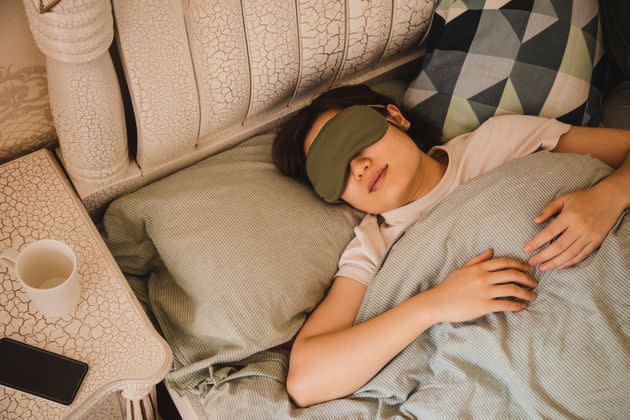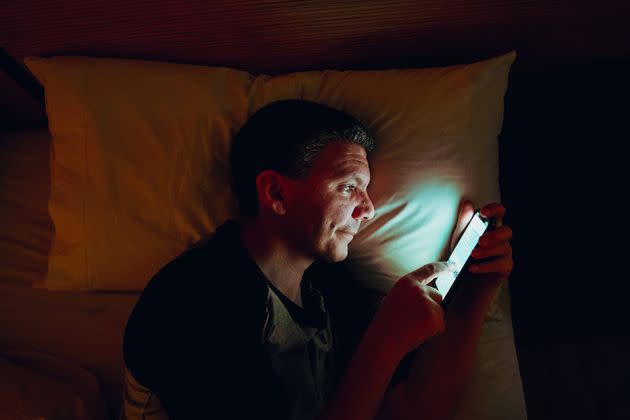
After a long day, falling asleep quickly can be a blessing. Getting the right amount of sleep can be hard enough, especially if you’re struggling with it revenge procrastination before bedtime – so when your head hits the pillow, you really want to be able to sleep, right? In any case, it is better than the alternative: lying in bed for hours.
According to sleep specialists, falling asleep too quickly (and too slowly) can be a symptom of a larger problem. The time it takes you to drift off to dreamland becomes clinical”sleep latency.” And while there’s no set “normal” — or better yet, healthy — amount of time it should take your body to fall asleep, there are some general guidelines.
“The ideal amount of time for the body to fall asleep really varies from person to person,” he says Kristen Caseya licensed clinical psychologist and insomnia specialist. “The National Sleep Foundation suggests this should happen about 15 to 20 minutes for a healthy person. However, humans are complex, so we may have more problems that prevent us from falling asleep well and that we probably have no control over.” For example, people with health problems may take 30 or 40 minutes, she said.
Sleep hygiene can help. “It’s good to spend the half hour before bed relaxing while we’re awake and doing some sort of nightly bedtime routine,” says Dr. Dave Rabin, a neuroscientist, board-certified psychiatrist, and co-founder and chief innovation officer. bee Apollo Neurosciencethat developed wearable technology intended to improve sleep. Fall asleep “Within half an hour is a good goal.”
What your body tells you when it falls asleep quickly
Falling asleep minutes after your head hits the pillow isn’t necessarily a cause for concern in general, but in some cases it can be a signal that something is wrong. The specific cause will vary from person to person, even if they have a similar sleep schedule or sleep in the same bed. However, here are some of the main culprits, according to the experts:
You just need more sleep.
“Falling asleep too quickly can be a sign of exhaustion, a sign that we’re overworking ourselves, a sign of burnout, and generally a sign that we’re not spending enough time recovering and resting,” says Rabin.
Furthermore, you may sleep long enough, but so is the sleep you get “unhealthy sleep,” or sleep that isn’t deep enough to really nourish you.
As you probably know, tackling lack of sleep can be easier said than done for many reasons. Many of us are incredibly busy, struggling with anxiety that keeps us awake — the list goes on. And because each person’s sleep journey is unique, different people need different treatments. So what can you do?
Casey recommended seeing your doctor. “We choose a treatment that is clinically indicated based on the cause of sleep latency problems,” she said. “For example, if someone falls asleep too quickly because they exercise too much and work twelve hours a day, they probably have a very high sleep drive. ‘Sleep drive’ is the body’s biological need for sleep.”
For this patient, she continued, treatment might look like making more time to sleep, adjusting the amount of exercise they do, and getting lab tests from the doctor to cover all the basics.
You have a mental illness.
Another possible reason Casey mentioned has to do with another aspect of your well-being.
“It can also be a side effect of medications or caused by mental health diagnoses such as depression,” she said. So again, you’re dealing with a catch-22: depression can make you sleepy, but so can certain antidepressants.
But since untreated depression for example can be dangerousit’s best to tackle it head-on. Antidepressants that are less likely to cause fatigue, anecdotalinclude bupropion, reboxetine and venlafaxine.
You experience sleep apnea.
sleep apnea, most common in older adultscould play too. “Sleep apnea is a chronic sleep disorder in which the upper airways are partially or completely blocked during sleep, leading to a decrease in blood oxygen levels and sleep fragmentation,” says Theresa Schnorbach, a sleep scientist at mattress companyEmma.
If you struggle with this, you may also notice fatigue and cognitive impairment during the day, she noted. As for treatment, she recommended a regular sleep schedule and, if appropriate, quitting smoking.
“If you suspect you have a sleep disorder such as sleep apnea, consider seeing your doctor,” he added Catherine “Katie” Yu, a psychiatric nurse in mental health care withThriveworks in Portland, Maine, who specializes in depression, anxiety and sleep/insomnia. She also recommends setting aside seven to eight hours for uninterrupted sleep.


What your body tells you as it slowly falls asleep
Now let’s talk about the other side of the coin: not being able to fall asleep. What’s going on there?
Interestingly enough, there are some of the same causes. “Difficulty falling asleep can be a symptom of insomnia, chronic pain, or a psychological or medical condition,” Casey said. “People who have trouble falling asleep are usually anxious, experiencing pain, or having trouble getting much sleep at night.”
Here are a few additional reasons why this can happen:
Your sleep routine isn’t the best.
With busy schedules, practicing a sleep routine (instead of just going to bed) can take effort, but it’s worth it. While some aspects are more difficult to address, not all are.
“Having inconsistent bedtimes, poor sleep habits, working non-traditional shifts (such as evening/night shifts or rotating schedules), undiagnosed or unmanaged health conditions such as stress, depression, anxiety, COPD, GERD and having a “Uncomfortable sleeping surfaces can all contribute to taking too long to fall asleep,” Yu said.
She points out that she drinks too much caffeine or drinks after 2 p.m., watches screens an hour before bed, naps during the day, takes decongestants and eats or exercises a lot right before bed. While you may not be able to change if you work or have a medical condition, consider taking medications, meditating before bed, or not going to bed later than necessary.
You feel emotional or stressed.
Rabin elaborated on the mental health aspect. “Virtually every mental illness often starts with difficulty falling asleep,” he said. “This doesn’t mean that if you have trouble falling asleep you have a mental illness, but it does mean that the body is struggling with something that is making it feel unsafe or unable to calm down enough to be vulnerable to falling asleep. come. – especially deep sleep states.”
Schnorbach agreed that anxiety, fear and other emotional worries can cause insomnia by leading “to an overactive sympathetic nervous system that controls the body’s fight-or-flight mechanism, causing the release of the stress hormone cortisol.” She also mentioned the horrible cyclical nature of this insomnia can lead to depression (and depression can make insomnia worse).
Again, Casey believes that seeing a medical provider is the best choice. “We may suggest psychotherapy to address a person’s anxiety if it is causing them to have difficulty falling asleep at night,” she said. “One technique that can be helpful is planned ‘care time’.” The latter is what it sounds like: give yourself about 10 minutes to worryand tell yourself that you can only worry during that period.
“The standard for treating sleep disorders in the medical community often involves the use of intensive psychotherapy such as CBTI, cognitive behavioral therapy for insomnia, which works but requires a lot of effort from the patient,” Rabin added.
He also mentioned the usefulness of at-home wellness practices such as breathwork, meditation, yoga, exercise, and exercise creating a soothing environment. Certain products can help with this, such as “brown noise” machines..
“You know your body best,” Schnorbach said. “Listen to it and be aware of any changes in the way you sleep.”




Leave a Comment